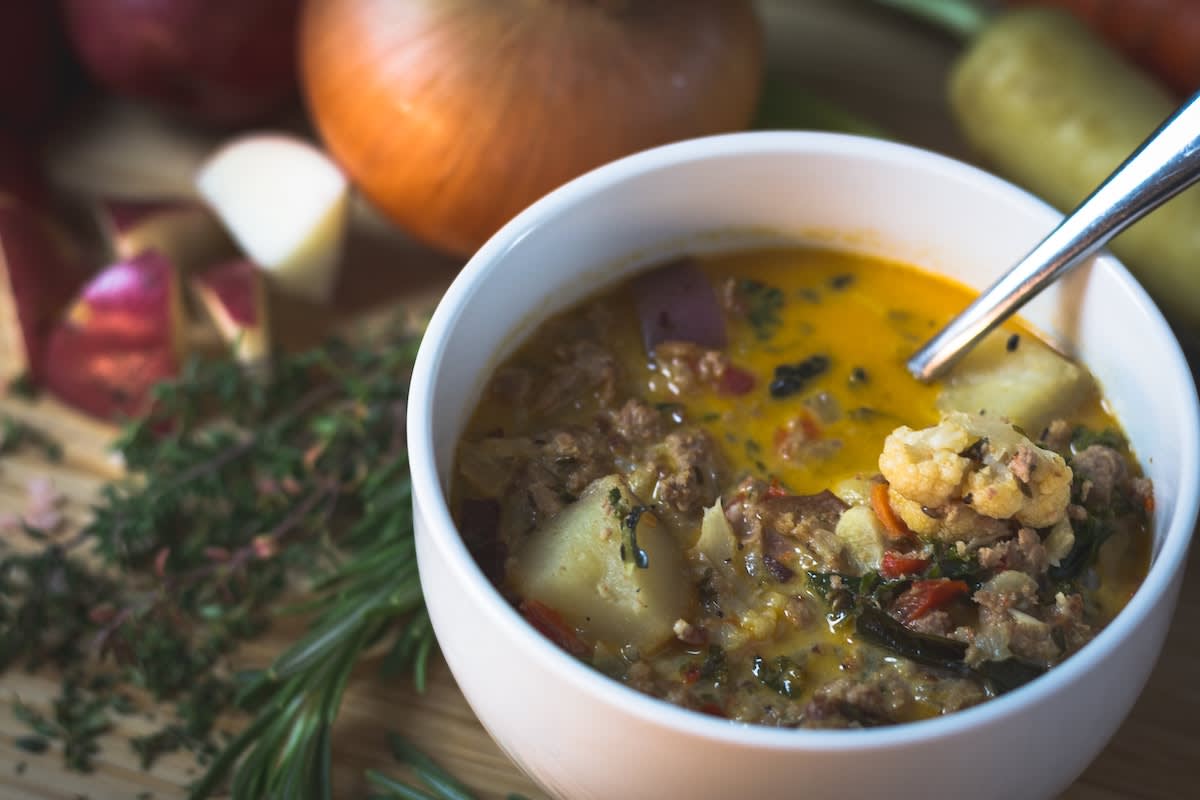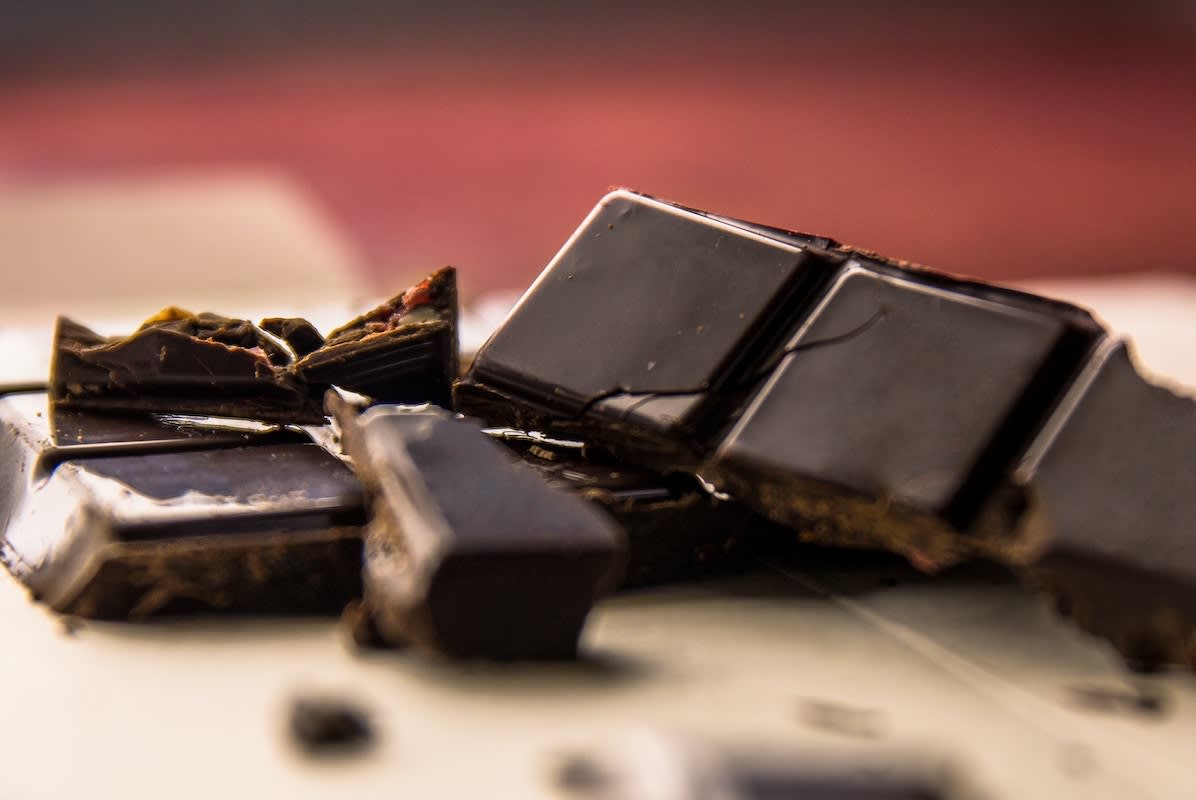
After a weekend (or holiday, or week!) of spiking your blood glucose with lots of added sugar and ultra-processed foods, your microbiome probably needs a soothing reset to help restore balance to your body. Overeating sugar can decrease the diversity of the gut microbiome and may increase inflammatory activity.6
How can you start to “reset”?
We asked Hilary Keiser and Janelle Connell from our clinical nutrition team what they suggest for those times when we might indulge a little too much. Here are a few tips that they gave us and a recipe that combines two of them to help give your gut a little soothing relief:
Xylitol (chewing gum, lozenges, etc.) taken immediately after consuming sugary or processed foods can help protect your oral microbiome. Oral microbes can metabolize sugars to create acids that lead to eroded enamel, causing cavities. Taking xylitol after eating helps increase saliva production to wash away leftover sugars or food particles in the mouth and reduces acidity in the mouth, thereby protecting your teeth.
Hydrate! Too much sugar can have a dehydrating effect. Drink plenty of water to help clear your system and prevent dehydration.
Try having a spoonful of nut butter. The healthy fats and protein in foods like almond butter, peanut butter, cashew butter, etc., can help slow digestion and prevent big spikes in blood sugar that make you feel yucky.
Peppermint tea is soothing on the stomach and helps relieve headaches that coming down from that “sugar high” may give you.7,8
Ginger can help decrease nausea, increase motility (so food doesn't linger in your digestive tract), and may contribute to changes in gut microbiome composition to increase anti-inflammatory activity*.1,2,3 And, last but not least, ginger may also help improve your body’s natural ability to manage blood sugar*.4
Low-sugar fermented foods (like sauerkraut, kimchi, kefir, or yogurt) have also been shown in studies to help change the gut microbiome composition to increase anti-inflammatory activity*.5
It’s soup season, and this infusion of ginger, sauerkraut or kimchi, veggies, and bone broth, which is also very soothing on the gut, should be perfect for giving your body a break from all that sugar and get you back on the path to balance.
Ginger-Infused Vegetable Soup with Sauerkraut
Ingredients
1 tablespoon olive oil
1 medium onion, chopped
3 cloves garlic, minced
1 tablespoon fresh ginger, grated
1 bay leaf
4 cups low-sodium chicken bone broth (or vegetable broth if preferred)
2 carrots, sliced
2 celery stalks, sliced
1 cup of your favorite Superfood vegetables, chopped
1 cup sauerkraut, kimchi, or your preferred fermented vegetable
Salt and pepper to taste
Fresh parsley for garnish (optional)
Squeeze of lemon
Instructions
In a large pot, heat the olive oil over medium heat. Add the chopped onion and sauté until translucent. Add the minced garlic and grated ginger. Sauté for another minute until fragrant.
Place the bay leaf in the pot and pour in the broth. Bring to a gentle simmer. Add the sliced carrots and celery to the pot. Simmer for another 10-15 minutes or until the vegetables are tender. Stir in your Superfood vegetables and cook until desired texture. Season the soup with salt and pepper to taste.
To serve, ladle the soup into bowls. Top each bowl with sauerkraut, kimchi, or your preferred fermented food.
Garnish with parsley and/or a squeeze of lemon if desired.
Enjoy, and feel better.
References:
1 Tóth B, Lantos T, Hegyi P, Viola R, Vasas A, Benkő R, Gyöngyi Z, Vincze Á, Csécsei P, Mikó A, Hegyi D, Szentesi A, Matuz M, Csupor D. (2018). Phytomedicine. 2018 Nov 15;50:8-18. doi: 10.1016/j.phymed.2018.09.007. Epub 2018 Sep 5. PMID: 30466995.
2 Hu ML, Rayner CK, Wu KL, Chuah SK, Tai WC, Chou YP, Chiu YC, Chiu KW, Hu TH. (2011). World J Gastroenterol. 2011 Jan 7;17(1):105-10. doi: 10.3748/wjg.v17.i1.105. PMID: 21218090; PMCID: PMC3016669.
3 Wang X, Zhang D, Jiang H, Zhang S, Pang X, Gao S, Zhang H, Zhang S, Xiao Q, Chen L, Wang S, Qi D, Li Y. (2021). Front Microbiol. 2021 Feb 23;11:576061. doi: 10.3389/fmicb.2020.576061. PMID: 33708178; PMCID: PMC7940200.
4 Huang FY, Deng T, Meng LX, Ma XL. (2019). Medicine (Baltimore). 2019 Mar;98(13):e15054. doi: 10.1097/MD.0000000000015054. PMID: 30921234; PMCID: PMC6455977.
5 Dimidi E, Cox SR, Rossi M, Whelan K. (2019). Nutrients. 2019 Aug 5;11(8):1806. doi: 10.3390/nu11081806. PMID: 31387262; PMCID: PMC6723656.
6 Garcia K, Ferreira G, Reis F, Viana S. (2022). Diabetology. 2022; 3(4):549-560. doi.org/10.3390/diabetology3040042
7 Chumpitazi BP, Kearns GL, Shulman RJ. (2018). Aliment Pharmacol Ther. 2018 Mar;47(6):738-752. doi: 10.1111/apt.14519. Epub 2018 Jan 26. PMID: 29372567; PMCID: PMC5814329.
8 McKay DL, Blumberg JB. (2006). Phytother Res. 2006 Aug;20(8):619-33. doi: 10.1002/ptr.1936. PMID: 16767798.



